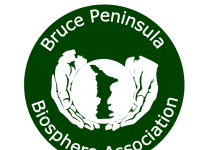
By Joanne Rodgers, Bruce Peninsula Press
A pollinator display garden in a repurposed canoe was recently planted at the Lion’s Head Beach by the Peninsula Pollinator Partnership. Their goal is “to encourage people to plant for pollinators and encourage pollinator habitat. Pollinator gardens are beautiful and buzzing with life!”
The members of the Peninsula Pollinator Partnership came together with the idea of helping pollinators by educating the public about pollinators and planting pollinator habitat. By creating a few display gardens to showcase pollinator-friendly plants, they hope to demonstrate how beautiful and low maintenance these plants are and encourage people to plant them in their gardens.
The Peninsula Pollinator Partnership is using boats that were donated for use as display gardens; all types of small boats are welcomed – rowboats, small sailboats or canoes.

The canoe garden located near the Lion’s Head Beach Pavilion was refurbished and painted using old Tremclad paint that was destined for the hazardous waste.
The Peninsula Pollinator Partnership says that they believe in the creative reuse and recycling of materials to keep as much as possible out of the landfill. Even the drainage material inside the canoe was reused styrofoam diverted from the landfill. Holes were punched in the bottom of the cane to allow water to drain away from the plants.
While pollinator-friendly plants can be both native and non-native, and provide ecological benefits, the Peninsula Pollinator Partnership does encourage planting of native species. Native species often support a broader range of biodiversity, and there is continually more knowledge gained about the amazing relationships between plants and all beings within the ecosystems.
Some plants which are good for pollinator gardens are: Black-eyed Susan, blanket flower, purple coneflower, Canada goldenrod, spiked blazing star, wild columbine, common milkweed, swamp milkweed, New England aster, Joe Pye weed, wild bergamot New Jersey tea, chokecherry, common elderberry, and serviceberry.
Local Nurseries such as EarthBound Gardens and even the local Hospital Auxiliary plant sale in June, are wonderful sources of native plants on the Peninsula for those looking to add to their garden.
The Peninsula Pollinator Partnership cautions “don’t remove plants from parks and wild places”. There are many lists of native Ontario Pollinator Plants online that can be found at the Canadian Wildlife Federation, David Suzuki Foundation, Nature Conservancy of Canada, Toronto Zoo.
If you have any questions about how you can start your own pollinator garden or if you wish to volunteer, please contact the Peninsula Pollinator Partnership via their Facebook page at Peninsula Pollinator Partnership and/or follow them for more info about upcoming events including an upcoming event with guest speakers.













